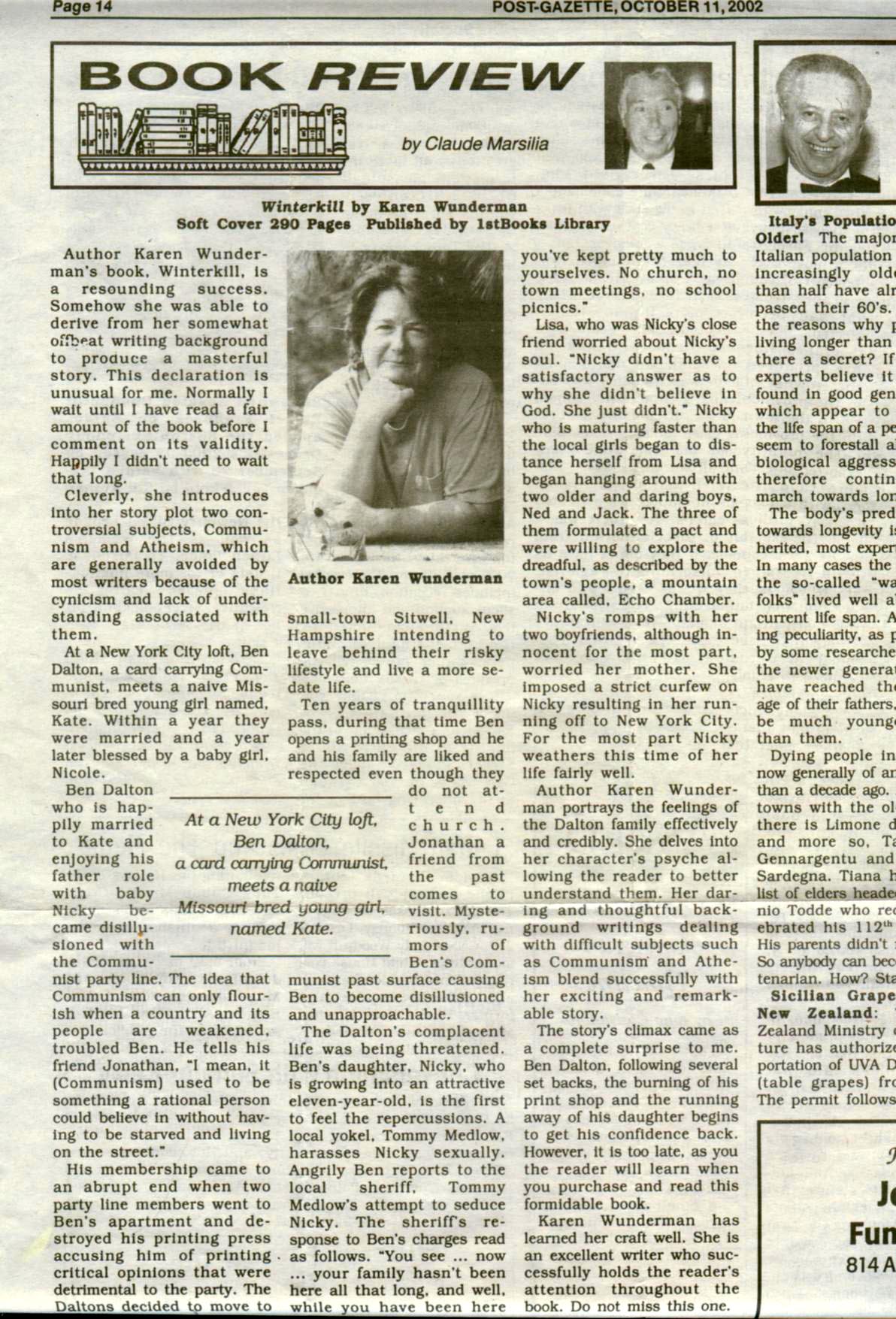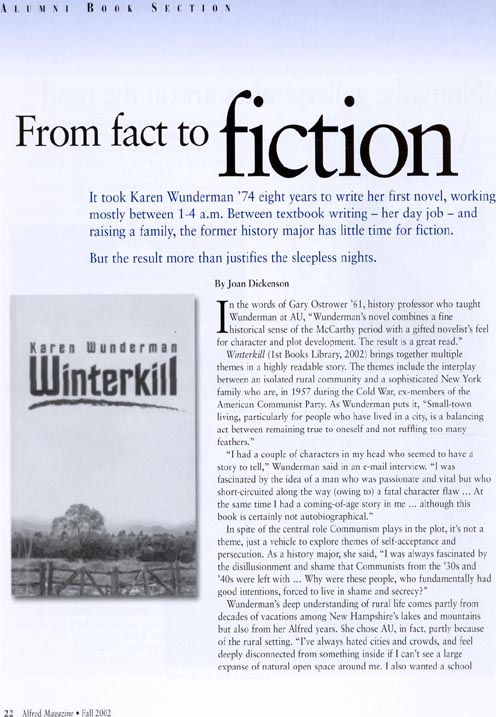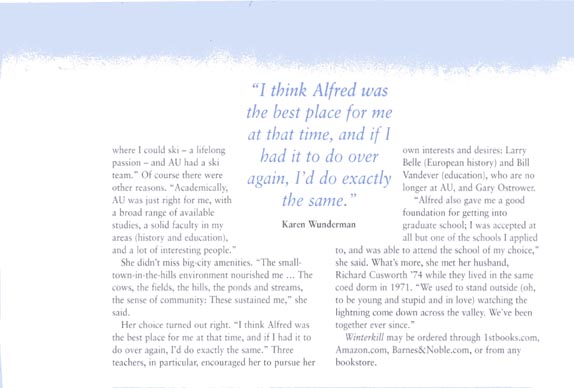Boston Post-Gazette; October 11, 2002:

|
|
BookReviewClub.com; June, 2003:
In today’s atmosphere of anti-terrorism and revived patriotism, Karen Wunderman’s Winterkill is particularly relevant, demonstrating how nonconformists were shunned and branded un-American during the Second Red Scare. Bypassing the sensationalism of McCarthyism, blacklisting, trials, denouncements and informants, Wunderman instead focuses on domestic communism of the common citizen.
Ben Dalton is a former communist, summarily forced to drop affiliations with the Communist Party in the 1940s because of differing, evolving views. He, his wife Kate and their daughter Nicky have moved to the small town of Sitwell, New Hampshire to begin anew. Sitwell presents the veneer of an idyllic town, where life is slow and uncomplicated. It is also, however, a town where conformity is king and where a select few periodically disappear.
Spanning the years from 1957 to 1964, the novel tracks the evolution of the Daltons’ lives. Nicky passes through puberty, entering the rebelliousness of adolescence and imminent adulthood. Ben struggles with displacement, having left behind the friends and purpose of the communist lifestyle. When the citizens of Sitwell discover his former political associations, Ben must battle new alienation and attacks on his family and livelihood. Kate, frustrated yet ever hopeful, is left to witness her husband’s perpetual doubts and torment.
Wunderman’s Sitwell is appropriately named, for its complacency and inertia. This same immobility freezes Ben, despite his seeking acceptance while never fully owning his past. Ben’s ostracism, Kate’s disillusionment and Nicky’s malaise all snowball in this novel of overwhelming futility. Even the reader participates in this ineffectualness, merely able to observe the downward spiral of events. Appropriate, yet rather cryptic, a saying in Sitwell sums up the feeling that “you can ride your horse but it won’t do you any good when the wind is blowing.”
Death is ubiquitous, both symbolic and literal. Symbolism comes in the guise of nature and its harshness. Ben is the single spruce in the Daltons’ yard that dies of winterkill because it is no longer surrounded by the warmth of the brush around it. Without his communism, friends and purpose, Ben is consumed by the elements, his directionless passion. Death also follows Nicky, who is obsessed with collecting red berries she calls “survivor seeds,” which she places near the dead. When her best friend’s grandmother dies, Nicky is fascinated and wants to hear all the details. Moreover, Echo Chamber, the local infamous hangout up the mountain, has a history of causing mysterious deaths. Finally, Ben’s demise is caused by a freak storm. Mortality is inescapable, especially in Sitwell.
Winterkill’s grim tone reveals not a jaded outlook; rather it encourages a practical urgency. Ben and his family demonstrate the dangers and uselessness of denial, immobility and hatred. Even though death is inevitable, a few characters come to terms with it and move forward. Nicky’s friend Jack realizes the fragility of life and makes a new start in California. Even Nicky and Kate leave behind the tragedy and drive away from Sitwell. The novel is harsh in its depictions, and no one is entirely blameless. Despite this, Wunderman never resorts to preaching. Instead, she acknowledges man’s inherent struggle to “slip through this life with a little grace.”
Reviewed by Hanh Nguyen, Reviewing Editor of BookReviewClub.com.
|
|
Alfred University Magazine; Fall, 2002:


|
|
Heartland Reviews; January/February 2003:
Winterkill is a novel encompassing the late 40s and 50s. Ben Dalton becomes disenchanted with his membership in the American Communist Party in New York and moves his wife and baby daughter to the White Mountains of New Hampshire. He starts up a small printing business in a community where one is considered a newcomer if he isn't there for at least four or five generations. Although Ben has run away from his past, word eventually gets out. The automatic shunning by the community and the ways in which Ben has to rise above his past make for a worthy plot.
The author portrays this small, dysfunctional family in a realistic yet tender way. The young daughter, Nicky, has more than the usual coming-of-age problems and ends up becoming a suspect in a bizarre murder of another teenager. Through all this, Kate, the wife and mother holds firm, trying to be the glue that holds the family together.
The author's setting, character, and dialogue treatments are her strong suits. This was a good study of Northeastern small town society.
|
|
Reader Reviews:
Reader reviews from Barnes & Noble.com:
Average Rating: 
A reviewer (kpreston36@comcast.net)
I loved this book
I easily read 25 books this summer. An ecclectic mix ranging from steamy romance novels to literary award winners, and lots in between. This was my favorite by far. It's not often that I begin a book and find myself enthralled to the point of not being able to put it down. I practically read it in one sitting. The writer lures you into the world of her characters and suddenly you find yourself with them. Seeing what they see, feeling what they feel, and really caring! After reading the last page at 4:00 a.m. I was reluctant to put the book down. I wanted it to go on - and I began to think. About the setting, the characters, the circumstances and the world in which they took place. . I carried it with me in my mind, long after I closed the cover. I am anxiously awaiting another novel from this author!
A reviewer 
Five stars for this one
This book is as much about escape as about growing up during the McCarthy period. It's a terrific story about people fleeing from one life to the anonymity of another, and about the way their daughter gets caught up in their escape. I've read books like this (Frank Conroy's "Body and Soul" comes to mind) that combine personal and political themes, but none does it as well. I guess what I most liked is the way that the author recognizes that reconciling past and present is a full-time task. I'd recommend this book even to someone who knows nothing about politics and the red scare of the 1950s.
Janis Hubschman (Janishub@aol.com), a writer and avid reader 
Square Pegs in the Mountains
Set in the late fifties, Winterkill is a thoughtful novel in which an ex-Communist party member from New York, Ben Dalton, seeks redemption in a quiet New Hampshire town. But, as he and his family soon discover, Sitwell is more likely to crush a man's spirit than to save it. Tension builds as Ben struggles to keep his past a secret and to blend in with the quirky, narrow-minded townspeople who seem content with their dull routines and bigoted opinions. The residents stand in sharp contrast to the mutuable, awe-inspiring landscape, which Wunderman paints with an expert's eye for sensual detail. The Dalton family, the young daughter in particular, feels the pinch of the former and the tug of the latter, as they try to navigate their way through this unfamiliar territory. Both a coming of age novel and a portrait of midlife reckoning, Winterkill will appeal to any reader who has felt like a square peg in a round hole. It's a page-turning read, with a conclusion that is at once shocking and inevitable.
Gary Ostrower, A reviewer
An undiscovered gem
This wonderful book was recommended to me, though I was warned that it was a "woman's novel"; Woman's novel, my foot. It is book for all of us, a fine story about a teen's coming of age. But be warned, for it is really a story about teens more than a story for teens. It takes place during the 1950s and 60s in an America wounded by McCarthyism. The characters are survivors of that sad episode, and they develop in ways that illustrate both our vulnerability and our resilience. If I had to sum it up, I'd call it a tough, smart, sensititive, grown-up book. The author writes beautifully. She has given birth to characters who are both recognizable and believable. There aren't many books that I wish were longer. This is an exception to that rule.
|